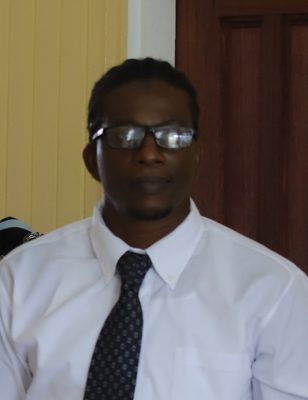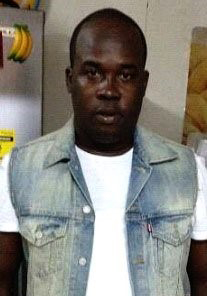The accused in the murder of Smyth Street businessman O’Riley Small had been found at the crime scene by a police investigator, the High Court trial of Maurice Prince heard yesterday.
Prince, a resident of Riverview, Ruimveldt, was charged with murdering Small on March 19, 2016.
The trial began yesterday before Justice Navindra Singh, and featured several witnesses, including Small’s sister, Charlene Ford, who said she caught a glimpse of the killer; former police investigator, Derwin Eastman, who said he found Prince at the crime scene a short while after the murder; and Crime Scene Investigator, Allister Rockcliffe, who discovered a jacket that allegedly linked Prince to the crime.
Ford, in her evidence-in-chief, told the court that on the morning of the murder, she was lying in her bedroom awaiting the arrival of her brother, whom she would open the door for. However, unlike the other times, her wait was interrupted by what she felt sounded like gunshots outside of their Smyth Street home.

The initial sounds, she said, were accompanied by the words, “Aye, bai, aye,” which she identified as having come from her brother. This was said to have been followed by rapid gunfire.
Explaining further, Ford said within seconds of the conclusion of the gunfire, she came out of the room, where she saw her mother, Petal Boston. After a brief exchange of words, the young woman said she ventured to a nearby window, from which she allegedly saw a tall, slim built man wearing dark clothing, exiting the yard.
The man she said, was clad in a long black pants and a black hooded jacket, which featured a green marijuana sign on its back; Ford noted, however, that she was not able to see the man’s face.
When asked if she had known Prince prior to the murder, Ford told the court that Prince was a friend of her brother’s and had visited him at their home on several occasions; a similar response was given by the mother of the deceased, who also testified yesterday.
Meanwhile, Eastman gave testimony related to the day in question, which started with the receipt of the report of murder, then the dispatch of officers to the scene, and ended with the processing of the accused as a suspect in the matter.
Eastman told the court that when he arrived at the scene, he saw a man who he identified as Prince, in a crouching position and in possession of a gun.
Having realized this, the former officer said he inquired from Prince whether he was a licensed firearm holder, to which he responded yes and produced a precept.
Eastman told the court that having been satisfied with the precept presented, he asked Prince to leave since he was intruding on an active crime scene.
However, after realizing that the dead body was that of Small, an individual who was known to him from previous brushes with the law, he ran back to the front of the yard to see if Prince was still there.
Having realized that he wasn’t, two officers were instructed to visit Prince’s home. This, however, yielded no results and a radio message was sent out to patrols to be on the lookout for Prince and his car, a white Allion bearing registration PRR1893.
The court also heard that further instructions were given to check the Rio Night Club in Queenstown, where Prince was subsequently taken into custody.
Eastman explained that having been notified of Prince’s apprehension, he travelled to the location, and from there he drove the accused’s car back to the Brickdam Police station, while the suspect was secured by two officers in the backseat of the car.
At the police station, Prince was said to have been processed as a suspect in the murder and his car was searched and swabbed by Rockcliffe.
It was during the search of the car by Rockcliffe that a black hooded jacket was discovered.
The court heard that the jacket, along with the clothing belonging to the accused, were removed and taken as evidence, while both Prince’s hands and nostrils were swabbed for gunpowder residue.
Rockcliffe noted that the steering wheel, gear stick and hand brakes in the car were also swabbed for gunpowder residue.
However, while under cross-examination by defence counsel Mark Waldron, the officer was asked whether any attempts were made to retrieve fingerprints from the fragments that were discovered at the scene. However, he explained that some of the fragments had been covered in blood, while others were wet, which would have made it difficult to test for fingerprints.
Rockliffe was also asked to respond to suggestions that the samples taken from the car could have been contaminated by Eastman, who had driven the car to the Brickdam Police Station. However, Rockcliffe simply said that he could not say whether the samples were cross-contaminated by the contact from Eastman.
The case is expected to continue today with the testimonies of several more witnesses.
Small was shot several times outside of his Smyth Street, Georgetown home. At the time, he had just returned from a hang in the city.
Small had escaped death twice before after he was shot in separate attacks. In 2009, he was one of five persons who were shot after a football match at the National Gymnasium. He was also one of three persons who was shot at the National Cultural Centre in 2012, where a football tournament was being played.





